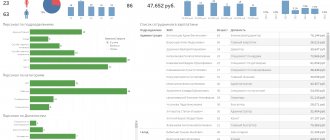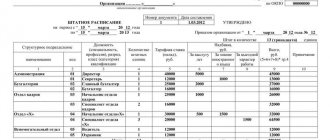Models of remuneration for civil servants in the Russian Federation
In the state civil service in the Russian Federation, a time-based form of remuneration in a time-based bonus system is widely used.
It involves the payment of an official salary and bonuses for completing “particularly complex and responsible tasks.” This form of remuneration does not stimulate Russian officials in the results of their work, since they are guaranteed a stable monthly income.
While the salaries of civil servants in New Zealand, Japan, Brazil, and Sweden directly depend on the growth rates of economic development!
The Budget Code of the Russian Federation determines the sources of financing the expenses of federal government bodies and government bodies of the constituent entities of the Russian Federation.
Articles 84 and 85 of the Budget Code of the Russian Federation contain provisions that:
- ensuring the activities of federal government bodies and their territorial representative offices is carried out exclusively at the expense of the federal budget,
- and state bodies of the constituent entities of the Russian Federation - at the expense of regional budgets.
In the state civil service, regulatory legal acts of the federal level and the level of constituent entities of the Russian Federation provide for three models of remuneration for state civil servants:
- cash support;
- monetary reward;
- remuneration based on indicators of efficiency and effectiveness of professional work activities.
The modern structure of remuneration models for state civil servants in the Russian Federation is established:
- Article 50 “Remuneration of civil servants” of the Federal Law of July 27, 2004 No. 79-FZ (as amended on May 1, 2019) “On the State Civil Service of the Russian Federation”;
- Decree of the President of the Russian Federation of July 25, 2006 No. 763 (as amended on September 19, 2019) “On the salary of federal state civil servants”;
- regulatory legal acts of the constituent entities of the Russian Federation.
Salary of state civil servants
Remuneration for state civil servants is made primarily in the form of salary:
- the use of the term CASH CONTENT instead of the term SALARY is due to the specifics of the state civil service in the Russian Federation and
- is intended to emphasize the difference between the state civil service and other labor activities regulated by the Labor Code of the Russian Federation.
As stated in Part 1 of Article 50 “Payment for Civil Servants” of Federal Law No. 79-FZ “On the State Civil Service of the Russian Federation”, the salary:
- is the main means of material support for a state civil servant and
- stimulating his professional performance in the position he is filling in the state civil service.
In accordance with Part 2 of Article 50 of Federal Law No. 79-FZ, the structure of the salary of a state civil servant is:
- monthly salary of a state civil servant in accordance with the position of the state civil service he occupies, more often referred to as the official salary ;
- monthly salary of a state civil servant in accordance with the class rank assigned to him in the state civil service - salary for class rank ;
- monthly payments;
- additional payments.
The official salary and salary for class rank together constitute the monthly salary of a state civil servant - salary .
Thus, in the structure of the salary of a state civil servant, two components can be distinguished:
- salary , which is the base of the salary, the basis of material support for a state civil servant, and depends on the official position of the state civil servant;
- additional payments , which are, first of all, stimulating in nature and depend on the specifics, special conditions for the performance of official duties by a specific government civil servant.
Salary = Salary (Official salary + Salary for class rank) + Monthly and Additional payments |
The size of the official salary of state civil servants
The size of the official salary of a state civil servant is determined:
- the position he occupies
- taking into account professional qualification groups in accordance with the Register of State Civil Service Positions.
Decree of the President of the Russian Federation of December 31, 2005 No. 1574 (as amended on February 8, 2019) “On the Register of positions in the federal state civil service”
In accordance with Part 3, 4 of Article 50 “Payment of civil servants” of Federal Law No. 79-FZ “On the State Civil Service of the Russian Federation”:
- The official salaries of state civil servants are established:
in the federal state civil service - Appendix No. 1 “Amounts of official salaries and monthly monetary incentives for federal state civil servants” to Decree of the President of the Russian Federation of July 25, 2006 No. 763 (as amended on September 19, 2019) “On the salary of federal state civil servants”;
- in the state civil service of the constituent entities of the Russian Federation - by regulatory legal acts of the constituent entities of the Russian Federation.
The official salaries of federal civil servants are established:
- separately for each type of federal government bodies and
- for each job title.
Amounts of monthly official salaries of federal state civil servants in accordance with the positions they fill in the federal state civil service:
Data from the Russian Ministry of Labor at the beginning of 2020 (rosmintrud.ru/ministry/govserv/money)
| p/p | Job title | Official salary (rubles per month) |
| 1. Positions in the category MANAGERS | ||
| Highest group of positions | ||
| 1 | Deputy Federal Minister | 10 305 |
| 2 | Department Director | 9 484 |
| 3 | Deputy Director of the Department | 9 119 |
| 2. Positions in the category ASSISTANTS (ADVISORS) | ||
| Highest group of positions | ||
| 5 | Assistant to the Federal Minister | 9 119 |
| 6 | Advisor to the Federal Minister | 9 119 |
| 3. Positions in the category SPECIALISTS | ||
| Main group of positions | ||
| 7 | Head of department in the department | 7 752 |
| 8 | Referent | 7 571 |
| Leading group of positions | ||
| 9 | Deputy head of department in the department | 6 750 |
| 10 | Lead Advisor | 6 659 |
| 11 | Advisor | 6 566 |
| 12 | Lead Consultant | 6 476 |
| 13 | Consultant | 6 385 |
| Senior group of positions | ||
| 14 | Chief expert | 5 838 |
| 15 | Leading specialist expert | 5 292 |
| 16 | Expert specialist | 4 743 |
| 4. Positions in the category SUPPORT SPECIALISTS | ||
| Leading group of positions | ||
| 17 | Leading specialist 2nd category | 6 111 |
| Senior group of positions | ||
| 18 | Senior specialist 1st category | 4 743 |
| 19 | Senior specialist 2nd category | 4 653 |
| 20 | Senior specialist 3rd category | 4 563 |
| 21 | 1st category specialist | 4 014 |
Salary amount for the class rank of state civil servants
The salary for a class rank allows you to:
- reflect the real level of qualifications of a state civil servant in monetary terms;
- assignment of a class rank emphasizes the value of an employee for a particular government agency;
- this value can be determined not only by conscientiousness and work experience, but also by individual qualities - unique skills and knowledge of the technology for preparing and implementing government decisions;
- state civil servants with the same class ranks receive the same salary for the class rank when performing different job duties .
Salaries for class rank of state civil servants:
- established regardless of the type of government body.
Within one group of state civil service positions:
- appropriate class ranks of 3, 2 and 1 classes are assigned (in order of increasing level of professionalism).
Article 11 “Class ranks of the civil service, class ranks of justice, diplomatic ranks” of Federal Law No. 79-FZ “On the State Civil Service of the Russian Federation”
Amounts of official salaries and salaries for the class rank of federal civil servants:
- are set as a fixed amount .
In addition, the President of the Russian Federation is given the right to:
- establish by its Decree the salary for certain positions of the state civil service in the form of a single monetary remuneration ,
- which takes into account the official salary, salary for class rank and monthly bonuses to the official salary for length of service in the state civil service,
- for special conditions of civil service, for work with information constituting state secrets,
- but bonuses and monthly cash incentives are not taken into account.
In accordance with Part 3, 4 of Article 50 “Payment of civil servants” of Federal Law No. 79-FZ “On the State Civil Service of the Russian Federation”:
- The salary amounts for the class rank of state civil servants are established:
in the federal state civil service - Appendix No. 2 “Amounts of official salaries and monthly monetary incentives for federal state civil servants” to Decree of the President of the Russian Federation of July 25, 2006 No. 763 (as amended on September 19, 2019) “On the salary of federal state civil servants”;
- in the state civil service of the constituent entities of the Russian Federation - by regulatory legal acts of the constituent entities of the Russian Federation.
Monthly salaries for the class rank of federal civil servants:
Data from the Russian Ministry of Labor at the beginning of 2020 (rosmintrud.ru/ministry/govserv/money)
| Name of class rank | Salary for class rank (rubles per month) |
| Acting State Councilor 1st class | 3 377 |
| Actual State Councilor 2nd class | 3 194 |
| Actual State Councilor 3rd class | 3 011 |
| State Councilor 1st class | 2 738 |
| State Councilor 2nd class | 2 556 |
| State Councilor 3rd class | 2 375 |
| State Civil Service Advisor, 1st Class | 2 099 |
| State Civil Service Advisor, 2nd class | 1 919 |
| State Civil Service Advisor, 3rd class | 1 735 |
| State civil service assistant 1st class | 1 644 |
| State civil service assistant 2nd class | 1 371 |
| State civil service assistant 3rd class | 1 280 |
| Secretary of the State Civil Service 1st Class | 1 098 |
| Secretary of the State Civil Service, 2nd class | 1 007 |
| Secretary of the State Civil Service 3rd class | 824 |
Indexation of salaries for the class rank of federal civil servants:
| Indexation date | Indexation coefficient | Presidential Decree |
| October 1, 2020 | 1,043 | dated September 19, 2019 No. 463 |
| January 1, 2020 | 1,04 | dated 12/12/2017 No. 594 |
| October 1, 2013 | 1,055 | dated 10/17/2013 No. 781 |
| October 1, 2012 | 1,06 | dated 05/03/2012 No. 572 |
| October 1, 2008 | 1,09 | dated September 21, 2008 No. 1394 |
| February 1, 2008 | 1,09 | dated March 29, 2008 No. 421 |
| December 1, 2007 | 1,15 | dated 10/18/2007 No. 1376 |
| January 1, 2007 | 1,1 | dated December 30, 2006 No. 1490 |
The amount of official salaries and salaries for the class rank of state civil servants of the constituent entities of the Russian Federation
The amounts of official salaries and salaries for the class rank of state civil servants of a constituent entity of the Russian Federation are established:
- various regulatory legal acts of the constituent entity of the Russian Federation.
In particular:
- most of the constituent entities of the Russian Federation have taken the path of establishing fixed amounts of official salaries and salaries for the class rank of state civil servants of the constituent entity of the Russian Federation in legislative acts (for example, Leningrad, Penza, Kaliningrad regions, etc.);
- a number of constituent entities of the Russian Federation establish the amount of official salaries and salaries for the class rank of state civil servants of the constituent entity of the Russian Federation in acts of the highest official of the constituent entity of the Russian Federation (for example, Moscow, Tyumen, Novosibirsk, Orenburg regions, etc.).
Amount of monthly and additional payments to state civil servants
Monthly and other additional payments to state civil servants include:
Part 5 of Article 50 “Payment for civil servants” of Federal Law No. 79-FZ “On the State Civil Service of the Russian Federation”
- monthly bonus to official salary for length of service in the civil service;
The amount of the monthly bonus to the official salary for length of service in the state civil service:
| State civil service experience | Amount of monthly bonus (as a percentage of official salary) |
| from 1 to 5 years | 10 |
| from 5 to 10 years | 15 |
| from 10 to 15 years | 20 |
| over 15 years | 30 |
The allowance was established in order to secure personnel in positions in the state civil service. The size of the bonus for length of service is the same for federal civil servants and state civil servants of a constituent entity of the Russian Federation, regardless of the position of the state civil service being filled.
The length of service in the state civil service is calculated on the basis of Decree of the President of the Russian Federation dated November 19, 2007 No. 1532 “On the calculation of length of service in the state civil service...” and Decree of the Government of the Russian Federation dated June 26, 2008 No. 472 “On the procedure for inclusion (credit) in the length of service in the state civil service...”.
- monthly bonus to the official salary for special conditions of the state civil service;
Subject to mandatory monthly payment and set as a percentage of the official salary, depending on the groups of positions filled in the state civil service.
In the federal state civil service - in accordance with clause 5 of Decree of the President of the Russian Federation of July 25, 2006 No. 763 “On the salary of federal state civil servants.”
In the state civil service of the constituent entities of the Russian Federation - in accordance with the regulatory legal acts of the constituent entities of the Russian Federation.
The amount of the monthly bonus to the official salary for special conditions of the civil service:
| Name of the position of the state civil service | Monthly bonus to the official salary for special conditions of the state civil service, % of the official salary |
| Highest group of positions | from 150 to 200 |
| Main group of positions | from 120 to 150 |
| Leading group of positions | from 90 to 120 |
| Senior group of positions | from 60 to 90 |
| Junior group of positions | up to 60 percent |
The specific amounts of this bonus, as well as the procedure for its payment, are established by the employer’s representative.
The monthly bonus for special conditions of the state civil service is stimulating in nature, because is established for each specific state civil servant individually and may vary depending on the effectiveness of the state civil servant in fulfilling his official duties.
- monthly percentage increase to the official salary for work with information constituting a state secret;
The bonus is paid only to those state civil servants who are required to work with relevant documents as part of their official duties.
The amount of this allowance according to Art. 4 of the Law of the Russian Federation dated July 21, 1993 No. 5485-1 is regulated by the Rules for the payment of monthly percentage bonuses to the official salary (tariff rate) of citizens admitted to state secrets on an ongoing basis, and employees of structural units for the protection of state secrets (approved by the Decree of the Government of the Russian Federation of September 18 .2006 N 573).
The amount of the bonus is set as a percentage of the official salary, depending on the degree of confidentiality of the information:
| Level of secrecy | The amount of the bonus (as a percentage of the official salary) |
| "Of special importance" | 50 — 75 |
| "Top secret" | 30 — 50 |
| “Secret” (when obtaining access with verification activities) | 10 — 15 |
| “Secret” (when obtaining access without conducting verification activities) | 5 — 10 |
- bonuses to state civil servants for performing particularly important and complex tasks;
The procedure for paying bonuses is determined by the employer’s representative, taking into account the tasks and functions of the government body and the execution of official regulations. The maximum amount of the premium is not limited by law. The limitation in this case may be the size of the wage fund. The decision to pay bonuses to state civil servants is formalized by a local act of the state body.
- a one-time payment to state civil servants when providing annual paid leave and financial assistance paid from the wage fund.
The procedure, amounts and features of providing additional payments to state civil servants are specified by regulatory legal acts of state bodies.
Monetary remuneration of a state civil servant
A variety of the current model of salary for a state civil servant:
- is a monetary reward ,
- which can be established for individual positions in the state civil service by decree of the President of the Russian Federation.
The structure of monetary remuneration takes into account:
- official salary,
- salary for class rank,
- monthly bonuses to the official salary,
- but bonuses and monthly cash incentives are not taken into account.
Part 3 of Article 50 “Payment for civil servants” of Federal Law No. 79-FZ “On the State Civil Service of the Russian Federation”
In practice, the monetary remuneration model is established for state civil servants holding government positions and for a number of civil service positions in the MANAGER category.
Remuneration of state civil servants according to indicators of efficiency and effectiveness of professional work activities
Parts 14-17 of Article 50 of Federal Law No. 79-FZ provide for the possibility of establishing:
- special procedure for remuneration of state civil servants
- for certain civil service positions.
In this case, remuneration should be made depending on the indicators of efficiency and effectiveness of professional work activities, determined in a fixed-term service contract. Thus, a special remuneration procedure can be applied exclusively to state civil servants with whom a fixed-term service contract has been concluded.
To state civil servants, whose wages are paid in the specified special order:
- The general conditions of remuneration established for state civil servants do not apply.
Performance indicators can serve both to evaluate the performance of a government body as a whole, and to evaluate the performance of state civil servants.
The main direction of improving performance indicator systems in the last decade in most Western countries has been related to:
- with finding the optimal balance between defining indicators for public authorities and public civil servants and
- establishing a close relationship between them.
Currently, the most common approach is to:
- at the level of government bodies, integral performance indicators are used that reflect the main political or economic parameters of its activities, for example, the unemployment rate,
- which are then decomposed to the level of structural units, for example, the number of developed retraining programs for the unemployed, and
- Finally, they reach the level of state civil servants, for example, the share of citizens applying for retraining per month.
This approach is also reflected in parts 14-17 of Article 50 “Payment of civil servants” of Federal Law No. 79-FZ “On the State Civil Service of the Russian Federation”.
If you have any questions about the violation of your rights, or you find yourself in a difficult life situation, then an online duty lawyer is ready to advise you on this issue for free.
RIGHT TO PUBLIC SERVICE
Options for continuing the employment relationship
Law No. 79-FZ (Part 1, Article 31) provides that in the event of a reduction in civil service positions, labor relations with the employees occupying them can be continued:
- if a civil servant is given the opportunity to fill another civil service position in the same state organization, or in another government agency, taking into account his length of work (service) in his specialty or length of civil service, the civil servant’s professional education and level of qualifications;
- when sending a civil servant for advanced training or professional retraining.
This kind of option is possible if the employer has positions in which some civil servants are on parental leave, are sick for a long time, are on long-term vacations without pay, etc.
It should be noted that simultaneously with the return to work of the “main” employee, the service contract concluded with the temporary employee is terminated.
Government bodies often employ not only civil servants, but also other categories of workers whose work activities are not regulated by Law No. 79-FZ. These include the so-called “technical performers”, service personnel, etc.
If a civil servant is transferred to positions not provided for in the Register of Positions of the State Civil Service of the Russian Federation, it is necessary to talk not about the transfer (transition), but about the dismissal of the employee from the civil service and the hiring of the same employee to a new position.
This is important to know: Resignation at your own request
If a civil servant refuses to be sent for retraining, or he is not satisfied with the alternative position offered, he is dismissed from the civil service due to reduction: clause 6 of part 1 of Article 33 of Law No. 79-FZ will be the basis for dismissal.
Annual financial assistance
Also, the military’s pay is increased through additional payments such as material assistance. The rules for the payment of this remuneration are established by Government Decree No. 993 dated December 5, 2011.
Annual financial assistance is provided to contract military personnel in the amount of at least one salary per month. For employees who had the right to receive this assistance, but did not apply for it during the year, this benefit is paid along with their salary for December.
Financial assistance is not provided to military personnel who were dismissed in accordance with Article 3, Part 4, Clauses 1-5 and Clauses 7-11 of Federal Law 306. In a situation where the benefit was issued before the occurrence of these circumstances, it is not taken from the last salary held. Also, financial assistance is not paid to military personnel who are at the disposal of their superiors and are dismissed at the end of the year, with the provision of leave upon dismissal, which ends in the next year (for the year in which the leave ends).
In the event of the death of a serviceman, annual financial assistance is paid to his relatives, similar to the procedure for paying bonuses for effective and conscientious performance of duties.
Award for efficient and conscientious performance of duties
The bonus for effective and high-quality performance of official duties is up to three bonuses per year. The rules for the payment of this bonus are established by the Government of the Russian Federation, Resolution No. 993 of December 5, 2011. This legal act states that the bonus in question can be paid monthly or quarterly, simultaneously with the issuance of monetary allowance in the month that follows the month or quarter for which it is paid bonus, and in December - for December or the 4th quarter.
This bonus is calculated on the basis of the VAT for the month, established on the first day of the month in which the bonus is issued, and in December - on the first of December of the current year.
In situations where a military man has served for less than a full month (quarter), the bonus is accrued for the time actually worked, based on the SDC that was due to the military man on the day the decision was made to pay the bonus.
The bonus is not given to military personnel: - who serve in units where rewards are established for completing and achieving large volumes of production tasks and other indicators; — who are sent outside the country for technical assistance and other duties; - at the time they are at the disposal of their superiors, except for those periods when military personnel performed duties in vacant military positions; - who were dismissed on the grounds provided for in clauses 1-5, 7-11, part 4 of art. 3 Federal Law 306.
If a serviceman dies, this bonus, accrued during his actual work, is paid to his wife (husband), and in her (his) absence - to the adult children who lived with him, the legal representatives of his minor children (disabled people who became disabled childhood, regardless of age) and other persons who were dependent on the deceased, in equal shares. In a situation where the military man was not married and had no children, the bonus is paid in equal shares to the parents.
DD fund according to federal law
Payments of monetary allowances are made from a special fund, from the DD fund for military personnel serving under contract, and the DD fund for military personnel serving on conscription.
The monetary allowance fund for contract soldiers consists of the assets of the military department of the central apparatus of the federal executive power, in which the Federal Law pre-establishes military service, and the monetary allowance fund for military personnel serving in military units, formations and bodies of the relevant federal executive authority, including territorial ones.
The DD fund is usually formed in excess of the amounts necessary to pay the required salaries for ranks and positions, taking into account monthly allowances, bonuses and financial assistance.
Thus, having examined the Federal Law on monetary allowances, we can conclude that the following patterns are inherent in the system of payments to military personnel: - the use of additional payments and compensations, taking into account the specifics of military service; — realization of the economic interest of contract workers in extending contracts; — social justice in the remuneration of military personnel and monetary incentives for career growth using coefficients of differentiation of the DD of various categories of military personnel; - a higher level of salary for the military compared to the salaries of ordinary citizens; — an increase in monetary allowances (certain types of payments) is carried out through their annual indexation.
Increased coefficients for certain categories of military personnel
According to Government Decree No. 1071 dated December 21, 2011, military personnel serving in military formations stationed outside the Russian Federation and military personnel performing tasks in the territories of armed conflicts in a state of emergency are entitled to additional cash payments, calculated using special increasing coefficients.
Pay increases as follows: - for service in a military unit stationed in Belarus - by 1.1 - for service in a military unit stationed in Ukraine - by 1.2; - for service in military units stationed in Azerbaijan, Kyrgyzstan, Armenia, Kazakhstan and Moldova - by 1.3; - for service in the military unit stationed in Abkhazia, Tajikistan and South Ossetia - by 1.4.
For military personnel who serve under a contract, when carrying out tasks during a state of emergency or during armed conflicts, their pay increases by a factor of 1.5.
The coefficients by which the DD of military personnel serving in the Far North and equivalent areas is increased are set out in the Appendix to Government Resolution No. 1237 of December 30, 2011.
Salaries according to rank and position for contract employees
Government Decree No. 992 dated 5.012.2011 established uniform salary amounts for standard military ranks and positions for contract employees in the Armed Forces of the Russian Federation, as well as salary amounts for positions to be filled by military contractors in the Foreign Intelligence Service, FSB, Federal Security Service and Special service objects under the President of the Russian Federation. In the appendices of this regulatory legal act there is a table of monetary allowances in terms of salary by rank and position, respectively.
As for non-standard military positions, their salaries are established by the heads of federal executive bodies, in which the Federal Law provides for military service, in accordance with salaries for standard military positions.
In the case when military personnel enter training at military vocational educational institutions, during their training they are set the same salaries for the positions and ranks that they held before training.
Allowances for conscript employees
The salary of military personnel serving under conscription may be increased: - for classification by category or class (similar to the allowances given to contract soldiers); - for specific conditions of service; — for performing tasks that are directly related to risks to health and life in peacetime; - for work related to information that is a state secret.
Also, separate payments are due to military personnel stationed outside the country and military personnel who perform tasks during a state of emergency, counter-terrorism operations or armed conflicts.
For specific conditions of service, the size of the bonus for conscripts ranges from 100% of the salary for a military position (for example, in the case of filling positions in the crews of submarines, autonomous deep-sea vehicles located on surface vessels, submarines under construction, in the technical crews of underwater stations) and up to 10% salary for a military position (for example, when filling positions in border agencies that directly guard the state border). The amounts of the monthly bonus for performing tasks that involve a risk to life and health in peacetime are similar to those established for contract soldiers.
The bonus for working with information that is a state secret can be 10, 20 or 25%, depending on the degree of importance.
Meaning of the term
Cash allowance (MS) is financial payments to military personnel. This concept applies specifically to the military; civil servants and civilian personnel receive wages or monetary rewards for performing their official duties.
In addition to military personnel, employees of the Ministry of Internal Affairs also receive DD in Russia. The salary of the Ministry of Internal Affairs is determined by Order of the Ministry of Internal Affairs No. 65 dated January 31, 2013.
The DD of an employee citizen is the means of his existence, the satisfaction of his needs, and is also an incentive in the performance of professional duties, compensating for the hardships associated with hard military labor and the hardships that are associated with it.
The amount of monetary allowance cannot be the subject of an agreement between the state and the military; its value is always clearly determined by legal acts.







